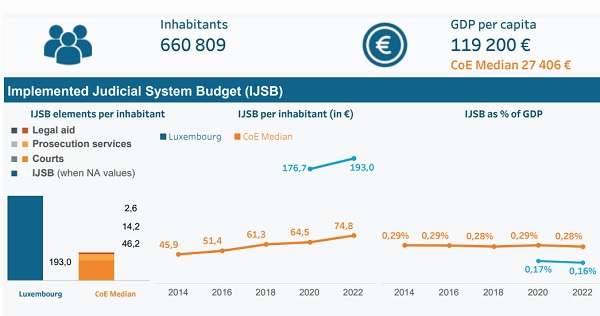 Credit: CEPEJ
Credit: CEPEJ
The European Commission for the Efficiency of Justice (CEPEJ), part of the 46-member Council of Europe, recently published its latest evaluation of the efficiency and quality of judicial systems across Europe.
This report identifies the main trends in the judicial systems of 44 European countries and two observer states (Israel and Morocco); Liechtenstein and San Marino were the only Council of Europe member states to not provide data.
According to the report, which uses data from 2022, the portion of the budget allocated to justice in most European countires remains low (about 0.31% of GDP) compared to other public sectors. On average, each country spends €85.4 per inhabitant on the justice system (median: €74.8), with wealthier countries generally allocating more than less wealthy countries.
Luxembourg's Implemented Judicial System Budget (IJSB) for 2022 was €127,510,164, i.e. €193 per inhabitant, representing one of the highest values in Europe. Its IJSB for 2022 was 0.16% of its GDP, which is among the lowest figures in Europe (Europe-wide average of 0.31% and median of 0.28%).
In 2022, Luxembourg's legal aid budget per inhabitant (€11.93) was above the Europe-wide median of €2.65. Its legal aid budget as a percentage of GDP (0.010%) was slightly below the Europe-wide median of 0.011%.
Moreover, Luxembourg granted €1,379 per case in legal aid in 2022, compared to a Europe-wide average of €631 and median of €320.
In 2022, Europe had an average of 22 judges, twelve public prosecutors and 180 lawyers per 100,000 inhabitants, although disparities do exist between countries. Luxembourg had one of the highest numbers of lawyers: 492.6 per 100,000 inhabitants, compared to a Europe-wide median of 155.5; the figures for 2012 were 384.8 and 111.6 respectively.
In terms of gender balance, 72% of professional judges in Luxembourg were women in 2022, but only 44% of court presidents were women. 52% of prosecutors in Luxembourg were women in 2022, compared with 46% in 2012. However, only 33% of heads of prosecution offices were women in 2022 (compared to 0% in 2021).
In the area of ICT, Luxembourg was found to have an ICT Deployment index of 4.1, which fell below the Council of Europe median. However, it was one of two states reporting automatically suggested decisions with judges writing assistance tools. The report also highlighted Luxembourg's "Paperless Justice" programme (digitalising exchanges and judicial files) and the "JUANO" application (pseudonymising court decisions using AI).
Regarding efficiency, the report noted that Luxembourg's courts were most efficient in civil cases in the first instance, although their disposition time has been increasing over the past decade (182 days in 2022). On the other hand, courts were least efficient in first-instance administrative cases (disposition time of 528 days).
The CEPEJ evaluation report, published on Wednesday 16 October 2024, is available in full at https://www.coe.int/en/web/cepej/special-file.








